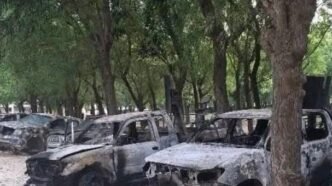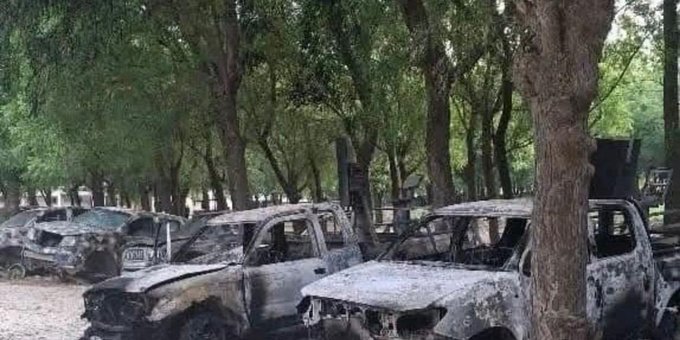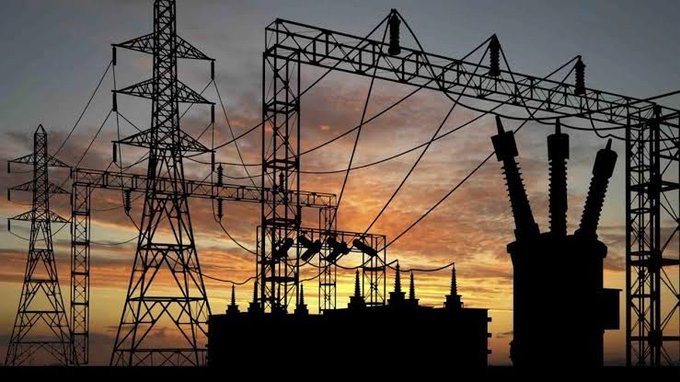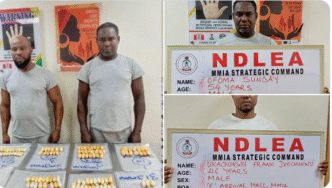Borno State, Nigeria – In a major escalation of violence in Nigeria’s North-East, suspected Boko Haram insurgents launched a coordinated attack on a Nigerian Army barracks in Banki, Borno State, seizing a cache of military weapons and inflicting significant damage. The assault, which occurred late Saturday night, has once again raised fears about the resurgence of the group despite ongoing counter-insurgency operations by the Nigerian military.
According to military and local sources, the insurgents stormed the barracks in large numbers, armed with heavy weapons, improvised explosive devices (IEDs), and gun trucks. The attackers reportedly engaged Nigerian troops in a fierce gun battle that lasted several hours. While the exact number of casualties remains unconfirmed, multiple reports suggest that several soldiers were either killed or wounded, and others forced to retreat as the insurgents overpowered the base’s defenses.
Eyewitnesses in Banki, a border town near Cameroon, said the attack left residents terrified. Many fled their homes and sought refuge in nearby bushes or attempted to cross into Cameroon to escape the violence.
The Attack on Banki Barracks
Banki, long considered one of the most vulnerable towns in Borno State due to its proximity to the Sambisa Forest and Lake Chad Basin — both strongholds of insurgent groups — has repeatedly faced attacks from Boko Haram and its rival faction, the Islamic State West Africa Province (ISWAP).
Security sources confirmed that the insurgents arrived in convoys of trucks mounted with heavy machine guns. They reportedly used rocket-propelled grenades (RPGs) and explosives to breach the perimeter of the barracks before engaging soldiers in close combat.
The attackers succeeded in carting away rifles, ammunition, and other military hardware. Residents claimed they saw the insurgents loading seized weapons onto their trucks before retreating toward the border region.
A military officer who spoke on condition of anonymity described the incident as “a serious breach,” admitting that the loss of weapons to insurgents remains a significant challenge for ongoing counter-terrorism operations.
Humanitarian Impact on Civilians
The attack has had immediate humanitarian consequences for Banki residents, many of whom were already living in displacement camps due to years of insurgency. The fear of further attacks has triggered another wave of displacement.
Local aid workers report that hundreds of families have been uprooted once again, with many seeking safety in Cameroon. Banki is home to one of the largest internally displaced persons (IDP) camps in the region, and renewed violence could worsen the already dire humanitarian situation.
A displaced resident, speaking from a makeshift shelter, described the ordeal:
“We heard gunfire all night. People were screaming and running. I held my children and we hid until morning. Now we have nothing — no food, no home, and no safety.”
Boko Haram’s Persistence in the North-East
This latest assault underscores the persistent threat posed by Boko Haram more than a decade after the group launched its violent campaign. Founded in 2002, Boko Haram escalated into a full-blown insurgency in 2009, seeking to establish an Islamic caliphate in Nigeria’s North-East. The conflict has since spread across the Lake Chad region, affecting neighboring Niger, Chad, and Cameroon.
Despite repeated claims by Nigerian authorities that Boko Haram has been “technically defeated,” the group continues to stage daring attacks, particularly on military formations and rural communities. The seizure of military weapons in Banki not only strengthens the insurgents’ firepower but also demonstrates their ability to regroup and strike strategic targets.
Government and Military Response
The Nigerian Army has yet to release a detailed statement on the Banki attack, though sources suggest that reinforcement troops have been deployed to the area. Fighter jets from the Nigerian Air Force were also sighted conducting aerial patrols around the border region following the incident.
Security analysts argue that such attacks highlight the need for stronger intelligence gathering and better coordination among security agencies. While Nigerian troops have achieved successes in dislodging insurgents from several territories, the ability of Boko Haram to regroup and launch offensives suggests that more needs to be done.
A senior security analyst based in Abuja explained:
“The attack on Banki demonstrates the insurgents’ tactical shift — targeting military bases to restock their arsenal. It is a reminder that defeating insurgency requires not only kinetic operations but also cutting off their supply lines and recruitment channels.”
Regional Implications
The location of the attack, on the border with Cameroon, has raised concerns about cross-border security. Banki serves as a crucial gateway between Nigeria and Cameroon, and the renewed violence could complicate joint military operations under the Multinational Joint Task Force (MNJTF).
Cameroonian authorities have reportedly stepped up border security, fearing a spillover of violence. Boko Haram has carried out numerous cross-border raids in the past, attacking villages and military outposts in Cameroon’s Far North region.
Ongoing Security Challenges
The Banki attack comes at a time when Nigeria is grappling with multiple security crises beyond Boko Haram. Banditry, communal clashes, and separatist violence in other parts of the country have stretched the capacity of security forces.
For residents of Borno State, however, the insurgency remains the most pressing threat. The attack on the barracks has left many questioning how much progress has truly been made in restoring peace to the region.
A local community leader in Banki told reporters:
“We have heard promises for years that Boko Haram is finished. But the reality is that they still have the power to kill, destroy, and take weapons from the Army itself. Until real peace comes, we are not safe.”
Call for Renewed Strategy
Security experts and civil society organizations are calling for a renewed strategy to deal with Boko Haram. While military operations remain crucial, many argue that tackling the insurgency requires a holistic approach addressing poverty, unemployment, and governance issues that have fueled extremism in the region.
Analysts also stress the importance of regional cooperation, given the cross-border nature of the insurgency. Joint patrols, intelligence-sharing, and coordinated offensives are seen as vital tools in preventing Boko Haram from regrouping and launching further attacks.
The Road Ahead
The attack on the Nigerian Army barracks in Banki is a stark reminder that the Boko Haram insurgency is far from over. The group’s ability to breach a fortified military installation and seize weapons demonstrates both resilience and evolving tactics.
For the Nigerian government, the incident is a test of its resolve to protect its citizens and reclaim stability in the North-East. For the people of Banki and surrounding communities, it is yet another chapter in a long and painful struggle for survival amid unending conflict.
As displaced families await assistance and the military regroups to prevent further incursions, one thing is clear: without decisive and sustained action, Boko Haram will continue to exploit vulnerabilities, prolonging the cycle of violence in Nigeria’s troubled North-East.














